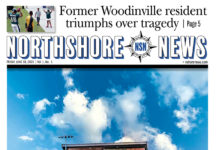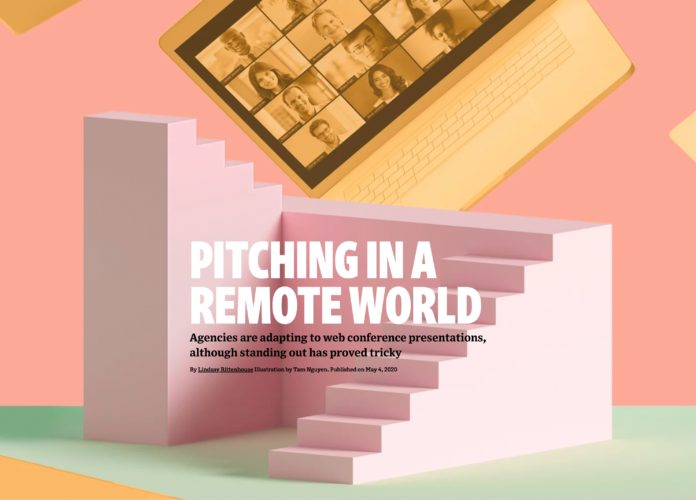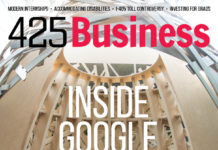The new pitch
Kids screaming, dogs barking, people who don’t realize they’re on mute practicing their miming skills are now the standard backdrop for any new business pitch. But agencies say they are adapting well to the new environment, and are thankful there is new business activity at all.
“The good news is there have been pitches,” Reyes says. “It did take some adjustment to work on a [remote] pitch, but I’ve been encouraged by how quickly people have grown accustomed to it.”
Gut Founder Anselmo Ramos says he’s been surprised by how many new briefs he’s received since the coronavirus pandemic started. He says the agency saw some projects halted initially in March, but then brief after brief starting flowing in.
“It was insane,” Ramos says. “We couldn’t believe it. We were like, ‘Really? You want to talk now?’”
Agency leaders have maintained that new business has remained steady; the reviews have just been shifted to video conferencing with teams making their pitch presentations via WebEx, Zoom and whatever other platforms clients prefer.
Omnicom Group Chairman-CEO John Wren, Interpublic Group of Cos. Chairman-CEO Michael Roth and Publicis Groupe CEO Arthur Sadoun have all commented on recent earnings calls that agencies continue to win new business.
“To be frank, I don’t feel comfortable pitching right now,” he says. “It’s been a conflict for me internally.”
The true state of new business
Tom Denford, North America CEO of management consultancy ID Comms, says while it is “perfectly reasonable to finish off a review” launched pre-pandemic, he would not necessarily recommend brands launch large-scale reviews at this time. “Let’s not make this a rush,” he advises.
Denford says that the reviews launched in January, before the pandemic, have continued for the most part (like AARP’s creative review). The reviews that were scheduled to launch in late first or second quarter are being pushed out to later in the year, he says.
According to ID Comms, about 20 percent of new business pitches have been canceled, a third have been postponed and half are continuing.
WPP CEO Mark Read tells Ad Age in a recent interview that he’s seeing pitches continuing “but maybe at a slower pace.” He says that while there seems to be a “steady stream of new business,” that “massive pitches” have been put on hold.
Ann Billock, partner at consultancy Ark Advisors, says there are still “a fair number of pitches out there.” She says Ark Advisors recently concluded a media review for one client and is involved in a media review for another. She declined to name them but said they operate in the financial services and destination sectors, respectively.
“They were both launched prior to the pandemic and they had to think long and hard to determine if they wanted to stay with [the pitch],” Billock says. “Both companies did; they decided it would be critical to be out in the marketplace and ready when things change.”
Still, Billock says Ark Advisor’s “own pipeline has slowed” since the start of the pandemic.
The art of the (remote) pitch
When new business opportunities do come in, agency executives say they are ready for them. The nine executives interviewed for this story all expressed how surprised they were by how easily their teams adapted to pitching remotely versus in-person.
“It’s been, knock on wood, a relatively surprisingly fluid process,” says Jim Misener, principal and president of Chicago agency 50,000feet. “I have been amazed by how easily everyone has slipped into a remote working environment.”
Jordan Fox, head of Laundry Service, says “it’s weird” that pitching remotely has come so naturally.
Fox says the agency has had to master every web conferencing platform to adapt to client preferences. “Zoom is the most prevalent in the marketplace,” he notes, but of course if the client prefers Google Hangouts, WebEx or any other platform, the agency has to be able to work in those too.
“In certain ways, it’s done exactly the way we did it before,” he says. “We put together a team, plan and present. That fundamental sequence is unchanged. Coordinating the work and presentation itself is a bit of a different animal in the pandemic era. We always rehearsed for pitches, but we have to do it much more rigorously now.”
Fox says “much more care and thought goes into the pitch prep” now. Before each presentation, he says Laundry Service delegates who on the team will have what responsibilities. Who will manage the slides? Who will lead the discussions? He notes that everyone involved has to test their WiFi strength and ensure they can be seen and heard on the video.
“Generally you go through the presentation, top to bottom, a couple of times,” Fox says, “while still always leaving room for spontaneity.”
He says Laundry Service hasn’t run into any technical difficulties on a new-business pitch yet. What has proved to be challenging, Fox says, is not being able to observe body language and facial expressions of the brand marketers the agency is pitching.
“What we learned early on with virtual pitching is you can’t read the room and adjust,” says Virginia Devlin, co-CEO of Current Global. Devlin says Current Global, part of IPG, also has been planning for pitch presentations more rigorously now than they had in the past.
“Each pitch has a pitch lead,” Devlin explains. “That person is the default person to pick things off to other people, determine who else is best to answer [during the presentation] and who helps orchestrate everything.”
Devlin says the agency will run through a presentation usually two to three times prior to the actual pitch to make sure everything runs smoothly; videos and slideshows are working; and that everyone knows their role. She says this detail is necessary to ensure “we’re not jumping in on each other,” but it has made the process “a little rigid.”
The art of standing out
As they enter web conferences with structured and rehearsed pitches, agencies are finding it most challenging to stand out from the pack, since clients are inundated with video presentations that probably all end up looking and feeling the same.
Devlin says Current Global typically will include a 45-minute video for the presentation, as well as build a microsite around it, so “clients can go deeper than what they saw in the video.” She says the agency also tries to coordinate backdrops to include the company logo or client-specific backgrounds. “If it’s a food and beverage company, we’ll maybe have a food-related background; things like that to spark some conversation,” Devlin says.
Brian McPherson, Goodby Silverstein & Partners managing partner, says the agency decided to go bold and entirely forgo the standard presentation (no PowerPoint slides or credential decks) in a recent new-business pitch.
“We decided early on not to do presentations but conversations; we’re not screen-sharing but just talking to them, and I think that’s really helped us,” McPherson says. “It promotes better connections and a better discussion.”
He adds, “I haven’t seen a lot of agencies’ pitch decks, but I would imagine they are remarkably similar.”
Changes that might stick
There are some tweaks in the way pitches are being carried out that agencies hope will last.
While some have felt the presentations have become more standardized, TBWA\Chiat\Day’s Reyes says the overall pitch process right now feels less so.
“There’s more flexibility,” she says. “Meeting times used to be when they needed to be. Lines are blurring a bit. There’s more openness to where each other is at. The process doesn’t feel so rigid. It feels kinder, and more around partnership than price.”
According to a recent study by ID Comms, agencies are less likely to participate in cost-driven reviews in the current environment. The study, which collected responses from 80 agency leaders, also found that shops are seeking more “streamlined” pitch processes to ensure their time and resources are not being wasted.
“There seems to be generally more understanding on both sides,” says Reyes. “What was once a long and arduous process, we’re finding doesn’t have to be that way. I’m liking what I’m seeing, honestly. Mainly the trend is how to get to decisions more quickly. If that can stay post-COVID-19, that would be fantastic.”














